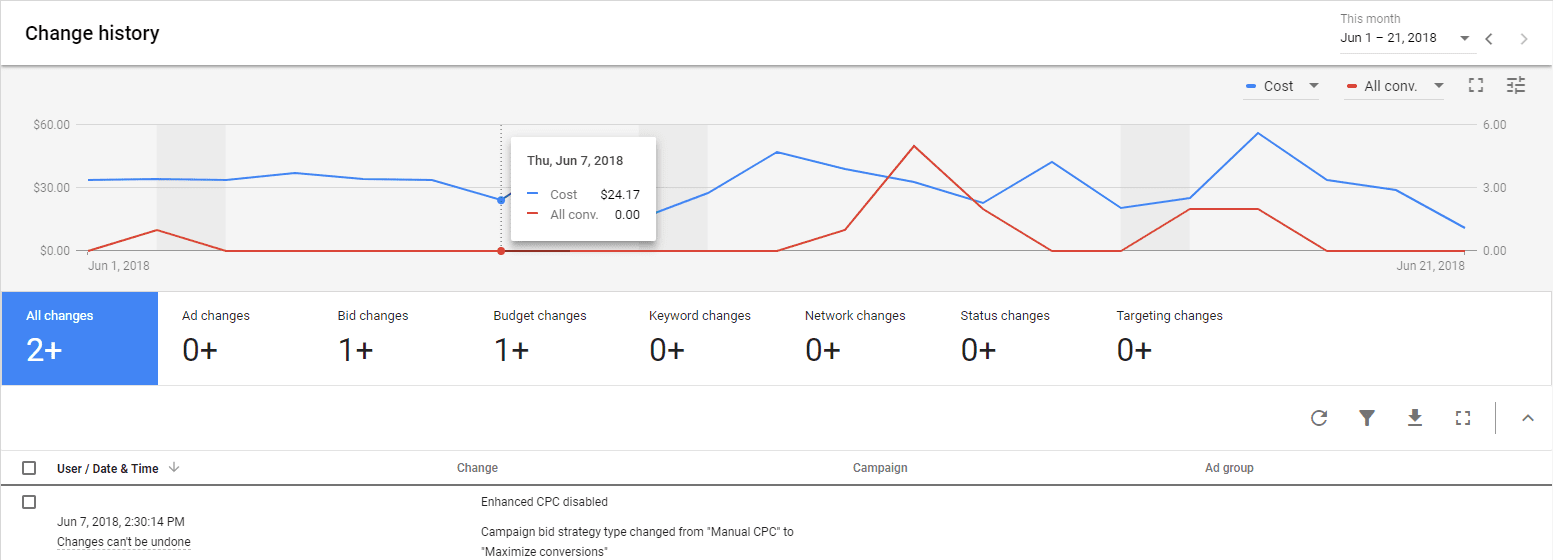What is Maximize Conversions?
Keyword bid optimization is the driving force of any successful Google Ads’ Search campaign. Making sure your bids are the right price help your ads get in front of the people that matter. But how can you assess what your bids should be while monitoring signals like ad scheduling, location, and device when each query that can trigger your ad is unique? The answer could be Maximize Conversions, an automated “auction time” bidding strategy available in Google Ads.
Maximize conversions is one of many of the automated bid strategies that Google offers and is centered around getting as many conversions as possible within your budget. This bidding strategy uses machine learning and “auction-time bidding” to make the best bid it can each time a query triggers one of your keywords. Additionally, Maximize Conversions uses many signals, some of which aren’t available in the AdWords interface: device, location, weekday/time of day, query (data based on text of the query that triggered your keyword), ad creative, remarketing lists, interface language, web browser, operating system, and demographics can all be taken into consideration each time one of your keywords is triggered. With these tools at its disposal, this bidding strategy is often able to make accurate predictions of if a potential customer will convert and bid accordingly.
Case Study
At The Great Online we’ve done tests of our own to monitor the performance of Maximize Conversions. In one of our accounts, we switched a campaign to Maximize Conversions a week into June 2018 after using Enhanced CPC for years. At the end of the month we found a 60% increase in conversion volume, a 37% decrease in cost per conversion, and 21% increase in CTR month over month with the same budget. Furthermore, to check if the change was seasonal, we looked year over year to June 2017 and found a 23% increase in conversion volume, 10% decrease in cost per conversion, and 31% increase in CTR. In this case, machine learning and Google algorithms beat out the active management of bids.

Should You Switch?
While there are many cases in which Maximize Conversions can improve performance, your marketing goals and limitations might call for something different. Let’s look at some requirements and drawbacks of Maximize Conversions.
- Conversion Tracking – You need to be tracking conversions so that when you acquire a valuable lead, you (or Google Ads) can learn from it.
- Budget – Check that you’re not using a shared budget. Also, note that this bidding strategy will try to spend your full daily budget every day – this could be a significant change when switching from manual bidding.
- Historical Data – Ideally, you should have some historical data including conversions before switching Maximize Conversions as it can use the data you have accumulated. When switching to Maximize Conversions, there will be a “learning” period where the bidding strategy is not fully optimized yet – the more historical data, the shorter the learning period.
- CPA Goals – If you are trying to reach a certain CPA target or other ROI goals, this might not be the strategy for you as it is only trying to get as many conversions as possible within the budget.
- Budget & Industry – Depending on what industry you are trying to advertise in, any given budget might only take you so far. In competitive industries clicks tend to be more expensive, so achieving a higher position can cost a lot more. If the algorithm thinks that you need to be in position one to get a conversion (whether it is due to lack of historical data, or the nature of the industry you are advertising in), you might end up spending a lot more than you need to.
Automated bidding strategies are powerful tools that can help you manage any Adwords account, but understanding the context in which to implement the correct one is crucial. When changing to an automated bidding strategy: make sure to test incrementally, note that performance will not be optimal during its learning period, and that is it not an alternative to actively managing an Adwords account. If you want to learn more about PPC management, feel free to contact us.

